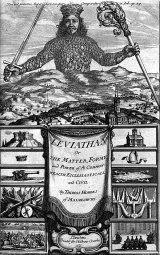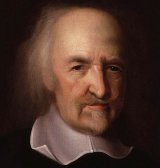Leviathan Page #17
Leviathan or The Matter, Forme and Power of a Common-Wealth Ecclesiasticall and Civil—commonly referred to as Leviathan—is a book written by Thomas Hobbes (1588–1679) and published in 1651 (revised Latin edition 1668). Its name derives from the biblical Leviathan. The work concerns the structure of society and legitimate government, and is regarded as one of the earliest and most influential examples of social contract theory.
But why then does our Saviour proceed in the curing of them, as if they were possest; and not as if they were mad. To which I can give no other kind of answer, but that which is given to those that urge the Scripture in like manner against the opinion of the motion of the Earth. The Scripture was written to shew unto men the kingdome of God; and to prepare their mindes to become his obedient subjects; leaving the world, and the Philosophy thereof, to the disputation of men, for the exercising of their naturall Reason. Whether the Earths, or Suns motion make the day, and night; or whether the Exorbitant actions of men, proceed from Passion, or from the Divell, (so we worship him not) it is all one, as to our obedience, and subjection to God Almighty; which is the thing for which the Scripture was written. As for that our Saviour speaketh to the disease, as to a person; it is the usuall phrase of all that cure by words onely, as Christ did, (and Inchanters pretend to do, whether they speak to a Divel or not.) For is not Christ also said (Math. 8.26.) to have rebuked the winds? Is not he said also (Luk. 4. 39.) to rebuke a Fever? Yet this does not argue that a Fever is a Divel. And whereas many of these Divels are said to confesse Christ; it is not necessary to interpret those places otherwise, than that those mad-men confessed him. And whereas our Saviour (Math. 12. 43.) speaketh of an unclean Spirit, that having gone out of a man, wandreth through dry places, seeking rest, and finding none; and returning into the same man, with seven other spirits worse than himselfe; It is manifestly a Parable, alluding to a man, that after a little endeavour to quit his lusts, is vanquished by the strength of them; and becomes seven times worse than he was. So that I see nothing at all in the Scripture, that requireth a beliefe, that Daemoniacks were any other thing but Mad-men. Insignificant Speech There is yet another fault in the Discourses of some men; which may also be numbred amongst the sorts of Madnesse; namely, that abuse of words, whereof I have spoken before in the fifth chapter, by the Name of Absurdity. And that is, when men speak such words, as put together, have in them no signification at all; but are fallen upon by some, through misunderstanding of the words they have received, and repeat by rote; by others, from intention to deceive by obscurity. And this is incident to none but those, that converse in questions of matters incomprehensible, as the Schoole-men; or in questions of abstruse Philosophy. The common sort of men seldome speak Insignificantly, and are therefore, by those other Egregious persons counted Idiots. But to be assured their words are without any thing correspondent to them in the mind, there would need some Examples; which if any man require, let him take a Schoole-man into his hands, and see if he can translate any one chapter concerning any difficult point; as the Trinity; the Deity; the nature of Christ; Transubstantiation; Free-will. &c. into any of the moderne tongues, so as to make the same intelligible; or into any tolerable Latine, such as they were acquainted withall, that lived when the Latine tongue was Vulgar. What is the meaning of these words. "The first cause does not necessarily inflow any thing into the second, by force of the Essential subordination of the second causes, by which it may help it to worke?" They are the Translation of the Title of the sixth chapter of Suarez first Booke, Of The Concourse, Motion, And Help Of God. When men write whole volumes of such stuffe, are they not Mad, or intend to make others so? And particularly, in the question of Transubstantiation; where after certain words spoken, they that say, the White-nesse, Round-nesse, Magni-tude, Quali-ty, Corruptibili-ty, all which are incorporeall, &c. go out of the Wafer, into the Body of our blessed Saviour, do they not make those Nesses, Tudes and Ties, to be so many spirits possessing his body? For by Spirits, they mean alwayes things, that being incorporeall, are neverthelesse moveable from one place to another. So that this kind of Absurdity, may rightly be numbred amongst the many sorts of Madnesse; and all the time that guided by clear Thoughts of their worldly lust, they forbear disputing, or writing thus, but Lucide Intervals. And thus much of the Vertues and Defects Intellectuall. CHAPTER IX. OF THE SEVERALL SUBJECTS OF KNOWLEDGE There are of KNOWLEDGE two kinds; whereof one is Knowledge Of Fact: the other Knowledge Of The Consequence Of One Affirmation To Another. The former is nothing else, but Sense and Memory, and is Absolute Knowledge; as when we see a Fact doing, or remember it done: And this is the Knowledge required in a Witnesse. The later is called Science; and is Conditionall; as when we know, that, If The Figure Showne Be A Circle, Then Any Straight Line Through The Centre Shall Divide It Into Two Equall Parts. And this is the Knowledge required in a Philosopher; that is to say, of him that pretends to Reasoning. The Register of Knowledge Of Fact is called History. Whereof there be two sorts: one called Naturall History; which is the History of such Facts, or Effects of Nature, as have no Dependance on Mans Will; Such as are the Histories of Metals, Plants, Animals, Regions, and the like. The other, is Civill History; which is the History of the Voluntary Actions of men in Common-wealths.
Translation
Translate and read this book in other languages:
Select another language:
- - Select -
- 简体中文 (Chinese - Simplified)
- 繁體中文 (Chinese - Traditional)
- Español (Spanish)
- Esperanto (Esperanto)
- 日本語 (Japanese)
- Português (Portuguese)
- Deutsch (German)
- العربية (Arabic)
- Français (French)
- Русский (Russian)
- ಕನ್ನಡ (Kannada)
- 한국어 (Korean)
- עברית (Hebrew)
- Gaeilge (Irish)
- Українська (Ukrainian)
- اردو (Urdu)
- Magyar (Hungarian)
- मानक हिन्दी (Hindi)
- Indonesia (Indonesian)
- Italiano (Italian)
- தமிழ் (Tamil)
- Türkçe (Turkish)
- తెలుగు (Telugu)
- ภาษาไทย (Thai)
- Tiếng Việt (Vietnamese)
- Čeština (Czech)
- Polski (Polish)
- Bahasa Indonesia (Indonesian)
- Românește (Romanian)
- Nederlands (Dutch)
- Ελληνικά (Greek)
- Latinum (Latin)
- Svenska (Swedish)
- Dansk (Danish)
- Suomi (Finnish)
- فارسی (Persian)
- ייִדיש (Yiddish)
- հայերեն (Armenian)
- Norsk (Norwegian)
- English (English)
Citation
Use the citation below to add this book to your bibliography:
Style:MLAChicagoAPA
"Leviathan Books." Literature.com. STANDS4 LLC, 2024. Web. 26 Dec. 2024. <https://www.literature.com/book/leviathan_192>.




Discuss this Leviathan book with the community:
Report Comment
We're doing our best to make sure our content is useful, accurate and safe.
If by any chance you spot an inappropriate comment while navigating through our website please use this form to let us know, and we'll take care of it shortly.
Attachment
You need to be logged in to favorite.
Log In